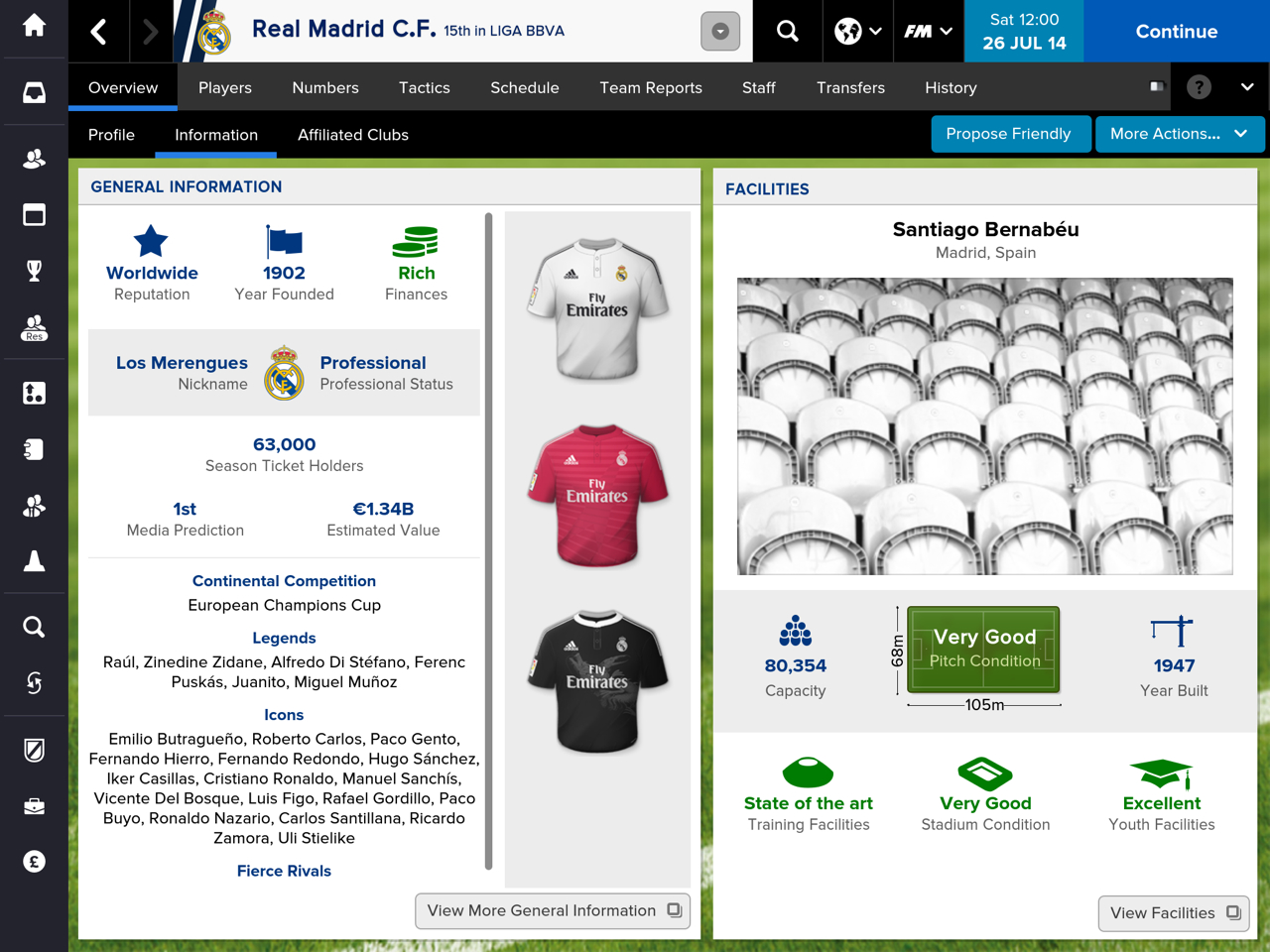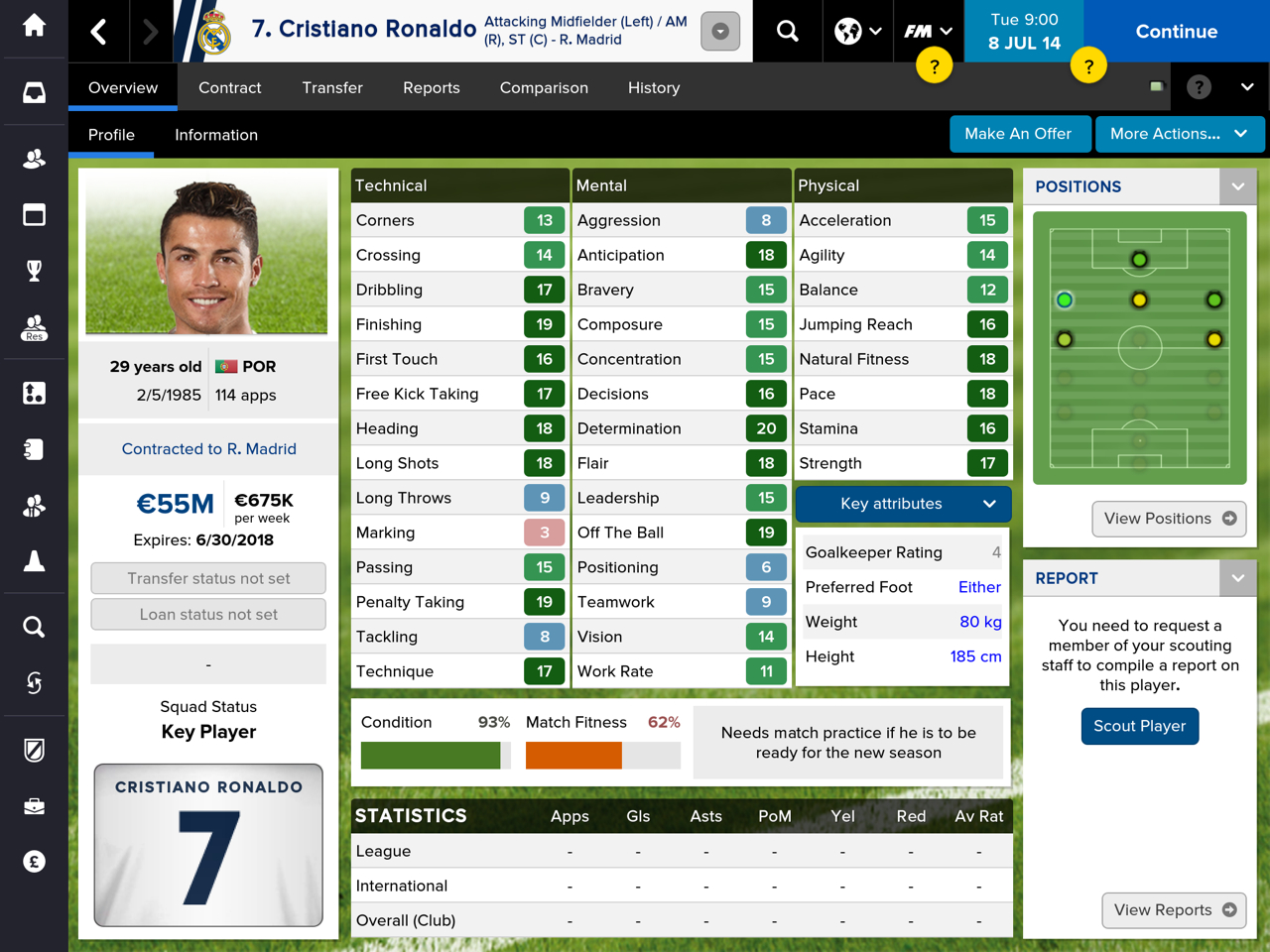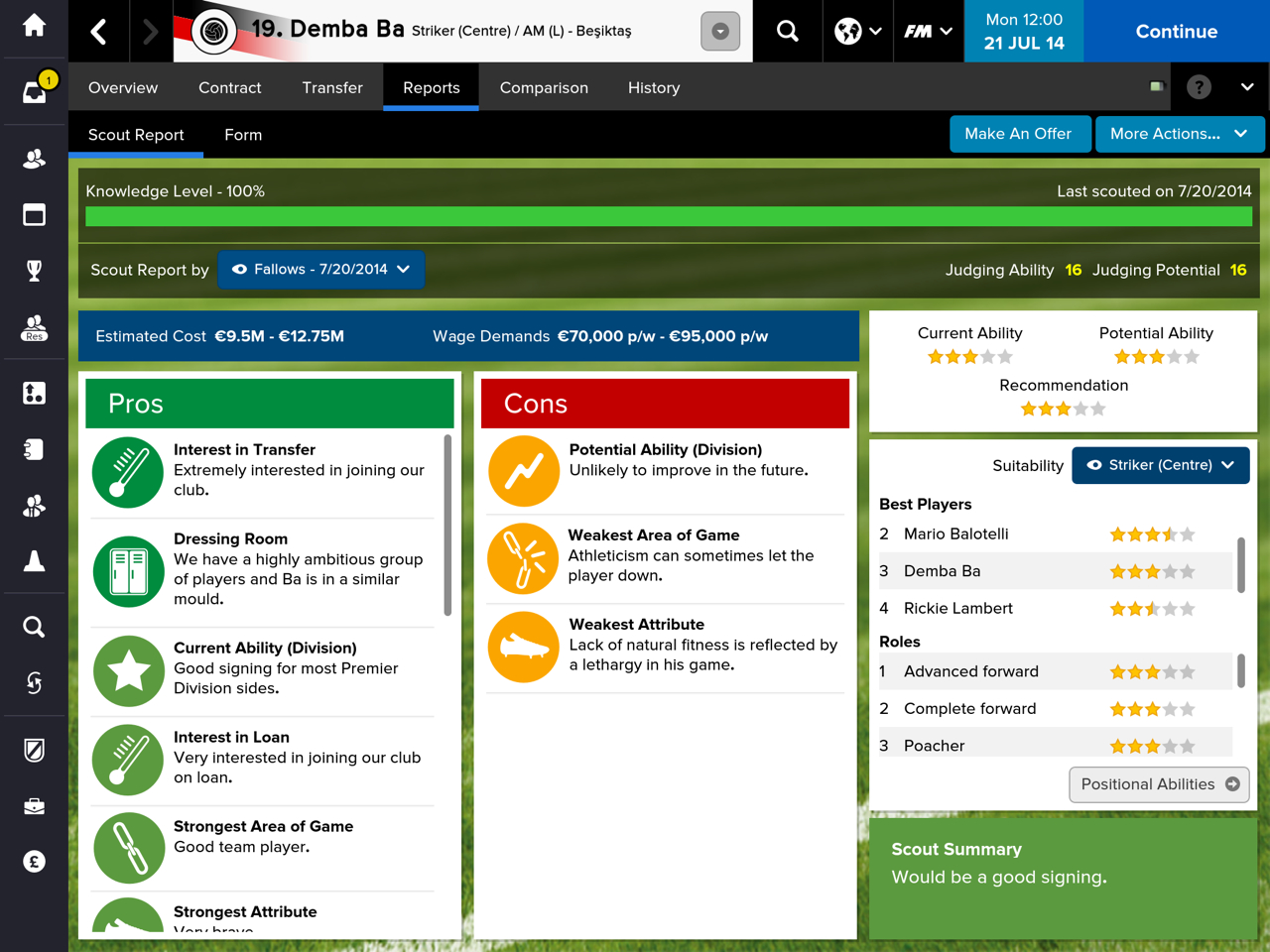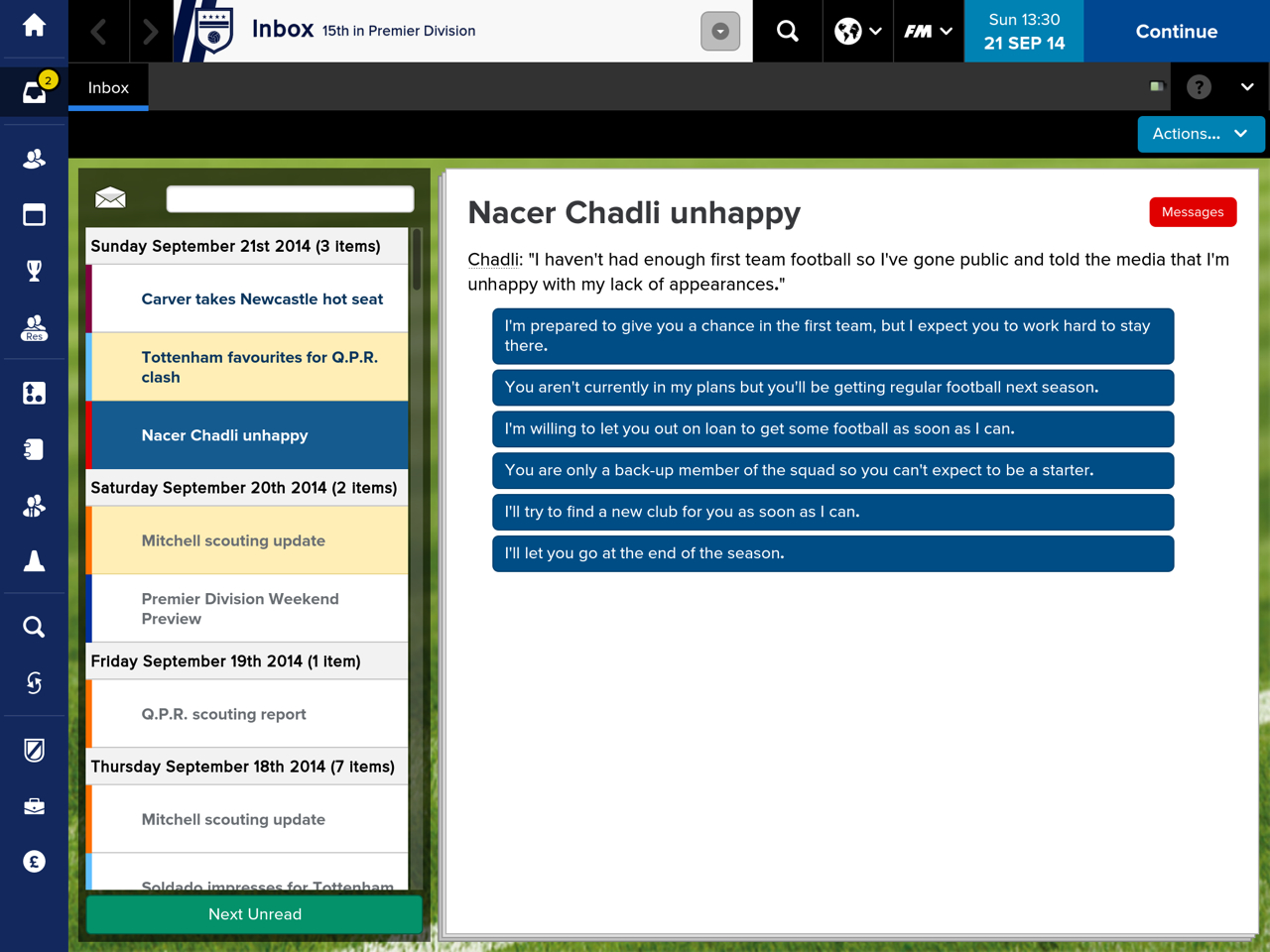![]() Necessary Disclaimer: Although this review is about the sport US readers call “soccer," I’ll be using the term football to be consistent with the game’s title.
Necessary Disclaimer: Although this review is about the sport US readers call “soccer," I’ll be using the term football to be consistent with the game’s title.
Throughout my gaming life spanning from the mid-80s to today, I’ve mostly gravitated towards games that ask a lot of a player but provide fantastic experiences in return. I loved the RPGs of the 80s and 90s (the Baldur’s Gates and the Fallouts), and also many classic hex-based strategy games (I still fondly remember Blue Byte’s Battle Isle and its glorious hexagonal warfare). I’ve always looked for games that made me feel that my choices, even small ones, mattered and games that let me create my own stories. In RPGs, I got to choose my class, equipment and, often, morality, while in strategy games, I often hand-picked the units I would bring to battle and had plenty of freedom in planning and executing my strategies. Unsurprisingly, I also really enjoyed many choose-your-own adventure gamebooks, and their later digital adaptations, for the stories they let me build and the sense, or illusion, of freedom they provided.
I’m sure you’re wondering why I’ve started a review of Sports Interactive’s Football Manager Classic 2015 (FMC) ($19.99), which has finally landed on tablets, with a confession of my love of RPGs, strategy games, and choose-your-own-adventure gamebooks. It’s because even though many don’t realize it, at its core, FMC is a game about creating stories. In my many, many hours playing Football Manager and its precursor, Championship Manager, I’ve had to make choice after choice and, in the process, I’ve created a multitude of stories. Playing Football Manager has always been a very intense gaming experience because I always know that every decision I make, like buying a new player or changing tactics mid-match, changes my story in the game. I’ve spent literally countless hours playing Championship Manager and, subsequently, Football Manager on both a PC and a tablet, and my clubs have experienced incredible highs and remarkable lows. Yet, even my failures have been entertaining because FMC has mastered the art of letting the player create unique and utterly entertaining stories in every single playthrough.
So, what exactly is FMC 2015, and why is its arrival on tablets (admittedly, only “high-end" tablets) a big deal for iOS gaming? In FMC you are the coach of a football club and you get to manage its every aspect, and I do mean every aspect. The Football Manager franchise has been primarily a PC game since its first appearance in 1993, and while a few years ago SI decided to develop a handheld version of the game (called Football Manager Handheld), the developers had to remove many of its features and shrink its huge player database to keep phones from exploding.
While the Handheld version was fun, by the time the 2015 version was published, many members of our forums were, rightfully so, complaining about its limitations and claiming that top-tier tablets had the processing power to run a full port of the PC game. I’ve no idea if SI developers read our forums, but they certainly tacitly agreed with these complaints and decided to port to high-end tablets the PC game’s “Classic Mode" (the Classic mode is a streamlined version of the full game, but for many, it’s the preferred way of playing the game because they consider the Normal mode too bloated).
By porting the PC game on tablets, SI has given iOS gamers an “open world" experience with almost no equal in the App Store – the game offers you the world as your playground, since you can pick any club out of 117 leagues from 51 nations around the globe. There’s absolutely no restriction over which club you can lead to triumph or humiliation. Even more importantly, almost all of those clubs have their real-world players and staff, which make the game an amazing reference guide to all things football and increase the sense of realism. Just to help you comprehend the range of possibilities and gameplay experiences this game can offer, imagine this: you could choose to lead Real Madrid, the Spanish superteam worth 1.3 billion, to the pinnacle of European football, or, if you are feeling more humble and want a greater challenge, you could manage Stevenage, a mid-level League 2 English club with an estimated value of 2.7 million.
Once you’ve decided which team you’ll be ruining next, you get to control pretty much every aspect of the club. You choose how you want your club to play by picking formations, tactics, which players should be playing and in which position, whether the club needs more players, and the list goes on and on. You primarily manage your players, but you can also deal with the club’s finances, infrastructure, and youth facilities, all to the degree you desire. The game does a fantastic job of catering both to your need to micromanage and to your desire to delegate. If you don’t feel like tinkering with every single aspect of your club’s day-to-day operation, you can let the game delegate the boring aspects to your staff. For example, if you hate having to figure out how best to train your players, you can have your assistant run the club’s training schedules. If you don’t want to deal with player contract negotiations, there’s an assistant for that job too.
The game also comes with an on-screen tip system that explains each menu and each option as well as a manual for those who miss the 90s. This franchise can be very daunting for newcomers, but the use of assistants lets players assume or relinquish control of the club to the degree that suits their free time, gaming habits, and degree of addiction.
Managing your players in FMC, which is what you’ll be doing most of your time, is a lot like managing your party in an RPG, minus the spellcasting. Even though your FMC “party" consists of more than just a handful of individuals, your club’s players still have their “classes"—defender, attacker, midfielder—and their attributes—jumping, movement, shooting, etc. Your players will often feel like more than just a collection of numbers because of how SI gives them personalities —they’ll disagree with the way you’re handling your transfer budget and get mad at you (which influences their morale and, in turn, their form), they’ll decide they’re homesick and will want to leave your club immediately (even though you spent almost your WHOLE budget to buy them less than a month earlier), and they’ll even get angry if you release a fellow player they like and won’t bother turning up on match day.
As when dealing with an RPG party, you’ll have to figure out how to plan your tactics around your players’ skills. You’ll have to decide where to play your really agile but weak player (answer: not between the other team’s huge defenders), or what duties to assign your slow but hulking defender (answer: not marking the other team’s fast attacker). You can also train your players to increase their skill levels and improve their performance.
When you finally decide who to play where (either through careful deliberation over each player’s skills, morale, and form, or simply by going with what your assistant says), the game moves to Match Day mode where you get to enjoy seeing Lionel Messi miss chance after chance either in full 3D or from a top-down perspective. This is the first Football Manager mobile iteration to come with the 3D engine, and it’s quite a welcome addition as it really brings the match to life. You get to watch as much or as little of the match as you want (you can watch either extended or just key moments of the match), and the match engine does a great job of giving you visual representations of the processor’s number-crunching. You can see whether your attacker is shooting for the moon rather than the goal or whether your defenders aren’t pressuring the opponent’s players enough.
Again, the developers provide plenty of help to those who aren’t very familiar with the franchise by having your assistant coaches offer observations on what’s working and what’s not and offer to remedy any issues at the tap of a button. It really is immensely entertaining sitting on the couch and watching your team perform on match day, all the while trying to figure out how to maximize each player’s performance or how to hold on to that goal you accidentally scored in the first minute.
Watching matches and managing your club might be fun, but many might wonder what FMC‘s end game is. Does a player have specific goals, or is this a sandbox game, which for some is a euphemism for an aimless experience? Well, the game offers a combination of both play-styles; at a micro-level, it’s goal-driven, and at a macro-level, it’s a sandbox. The game is full of short-term goals that you have to achieve if you want to stay employed. Your Board will set goals each season (depending on the club you pick and your previous coaching experience), and if you don’t achieve them, you’ll get fired pretty soon (your club’s fans might even riot against you and force the Board to sack you).
However, your career doesn’t end when you get fired, and this is where the sandbox aspect of the game comes in; instead, you end up on the unemployed list, and you start applying to coaching positions that pop up as other coaches fail to live up to their club’s expectations. If you have a good enough reputation (which you build through the seasons), you could even land a better job than the one you had before getting fired. If you’re successful in your coaching gig, many other opportunities can arise, including better clubs knocking at your door or even national teams wanting you to lead their country to World Cup glory.
So, when you consider all the decisions you have to constantly make while inhabiting a very detailed and fleshed-out game world, you’ll realize that FMC really is like a very good choose-your-own adventure gamebook almost at every turn. Imagine you’re doing such a great job at your club that the U.S. National team comes knocking. Do you say no and stick with your club in order to see whether the youngsters you bought with so much hope will turn into superstars? Or do you jump ship and try to prove your worth by winning the World Cup with the U.S. team? Even smaller decisions can have a huge impact in your time with the game. Remember that one player you bought from Brazil when he was 18 just because you had a million or so sitting in the bank? He turned out to be a star, sold for 25 millions, made your club rich, and let you to build a much stronger club and hunt for the big trophies.
Every single choice in this game matters, and no two careers feel the same. Injuries, mistakes, luck, bad or good decisions, all culminate to make each FMC playthrough a distinct experience filled with “Do you remember that one time when…" moments. And for those who like to call FMC a spreadsheet game, well, I’ve never agonized so much over spreadsheet numbers as I did when I was down 3-1 in the Champions League Final with a few minutes to go, hoping that I could get a miraculous win (which I did, and it was glorious).
With such a high level of micromanaging and detail in FMC, the way it controls is crucial to player enjoyment. SI claims that it has optimized the UI for touchscreens, and for the most part its claims are valid. Despite the UI consisting of a great number of menus, they’re all where you’d expect them to be, and that gives the game a coherence that most other management games lack. FMC‘s interface resembles that of web browser, which makes navigating the game very intuitive for anyone who’s used to browsing the internet.
The only problem I’ve had with the interface is with scrolling —it’s often quite floaty, and you can have a hard time scrolling up and down long lists. This was more of an annoyance than a game-breaker, but I wish they had made the scrolling more responsive. The other problem I’ve had is the odd crash, which would’ve been fine if it didn’t mean that if the game crashes just after a match, the match result can be completely different when you reload your game. Hopefully, that’s something the developers will fix soon.
I find that with all the gameplay variety and level of detail FMC 2015 offers, its price is appropriate, even though not everyone in the forums will agree. It’s $19.99, which is at the higher end of the spectrum for iOS gaming (at the same price X-COM Enemy Unknown was), but this is a full port of a very complex PC game. Many mobile gamers complain about the lack of more “hardcore" games on iOS and about the F2P cataclysm, but at the same time, they are unhappy when publishers put full PC games on the App Store at high, but still cheaper than PC prices. I would’ve paid more than $19.99 to play this game on PC, and this version has the added bonus of allowing me to play the game anywhere I want to.
For those who like to grease the wheels a bit and make their lives easier, the game also offers some “interesting," but unnecessary, IAPs like a Magic Sponge that treats any injury immediately or Spoiled Lasagna that can make some of the opponent’s players conveniently unavailable. All the IAPs are optional, and you’ll never hit a wall where only an IAP can save your career.
Football Manager Classic 2015 is a fantastic game not just for those who love the sport, but also for anyone who enjoys RPGs and choose-your-adventure gamebooks. With its great help system, you’ll rarely feel like you’re drowning in numbers and menus despite the game’s complexity, and the UI makes navigating the game very intuitive. Despite a few UI niggles, that will hopefully be fixed soon, the game mostly plays nicely with the tablet screen. Every playthrough feels like a different journey, and that makes FMC 2015 a game with almost infinite replay value.
So, if friends have told you that this game is boring or too complicated, do yourself a favor and ignore them. FMC offers countless hours of entertainment, and there are so many stories waiting for you that you won’t regret taking the plunge. Now, excuse me because I have to go find out why my star striker has forgotten how to kick the ball. Perhaps I should just publicly humiliate him and hope the Board members won’t get angry with me for messing with their star player (all real things you can do by the way). See you on the pitch.




